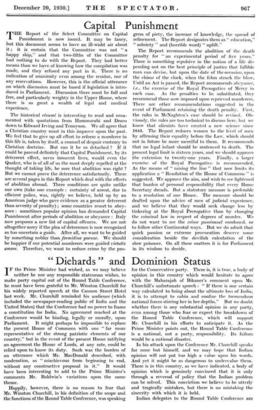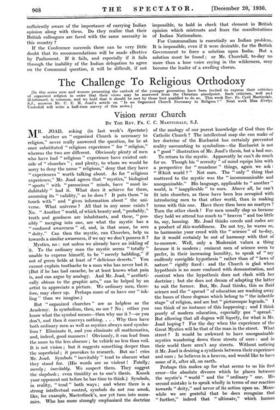" Diehards and Dominion Status
IF the Prime Minister had wished, as we may believe -I- neither he nor any responsible statesman wishes, to make party capital out of the Round Table Conference, he must have been grateful to Mr. Winston Churchill for his -widely reported speech at the Cannon Street Hotel last week. Mr. Churchill reminded his audience (which included the newspaper-reading public of India and the United States) that the Conference had no power to frame a constitution for India. No agreement reached at the Conference would be binding, legally or morally, upon Parliament. It might perhaps be impossible to replace the present House of Commons with one " far more representative of the strong patriotic elements of our country," but in the event of the present House ratifying an agreement the House of Lords, at any rate, could be relied upon to know its duty. Such was the burden of an utterance which Mr. MacDonald described, with moderation, as " mischievous from beginning to end, without any constructive proposal in it." It would have been interesting to add to the Prime Minister's comments Mr. Baldwin's variations upon the same theme.
Happily, however, there is no reason to fear that Mr. Winston Churchill, in his definition of the scope and the functions of the Round Table Conference, was speaking for the Conservative party. There is, it is true, a body of opinion in this country which would hesitate to agree with the Maharajah of Bikaner's comment upon Mr. Churchill's unfortunate speech : " If there is one certain way calculated to bring about the ultimate loss of India, it is to attempt to cabin and confine the tremendous national forces stirring her in her depths." But we doubt whether there is any substantial opinion in any party, even among those who fear or expect the breakdown of the Round Table Conference, which will support Mr. Churchill in his efforts to anticipate it. As the Prime Minister points out, the Round Table Conference is a national, not a party, responsibility. Its failure would be a national disaster.
In his attack upon the Conference Mr. Churchill speaks for none but himself, and we may hope that Indian opinion will not put too high a value upon his words. And yet it might be as dangerous to undervalue them. There is in this country, as we have indicated, a body of opinion which is genuinely convinced that it is only through a reversal of policy that the Indian problem can be solved. This conviction we believe to be utterly and tragically mistaken, but there is no mistaking the sincerity with which it is held.
Indian delegates to the Round Table Conference are sufficiently aware of the importance of carrying Indian opinion along with them. Do they realize that their British colleagues are faced with the same necessity in this country ?
If the Conference succeeds there can be very little doubt that its recommendations will be made effective by Parliament. If it fails, and especially if it fails through the inability of the Indian delegation to agree on the Communal question, it will be difficult, if not impossible, to hold in check that element in British opinion which mistrusts and fears the manifestations of Indian Nationalism.
For Communalism is essentially an Indian problem. It is impossible, even if it were desirable, for the British Government to force a solution upon India. But a solution must be found ; or Mr. Churchill, to-day no more than a lone voice crying in the wilderness, may become the leader of a swelling chorus.







































 Previous page
Previous page